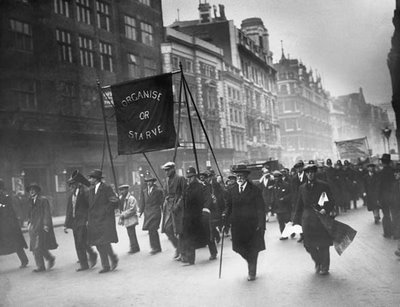Taken from the bleakness to come.
 The week began with the bankruptcy of Lehman Brothers, and the commentariat decreed that this showed that the Fed was no longer prepared to bail out anyone who came running begging for mercy. The week ends with what might be the biggest dead cat bounce that the FTSE has ever seen, leaping nearly 9% in one day, all on the back of the Fed announcing a plan which will to all intents and purposes involve the nationalising of all the losses and bad debt that has led to this week's banking crisis. Dsquared in the comments on Blood and Treasure probably sums it all up:
The week began with the bankruptcy of Lehman Brothers, and the commentariat decreed that this showed that the Fed was no longer prepared to bail out anyone who came running begging for mercy. The week ends with what might be the biggest dead cat bounce that the FTSE has ever seen, leaping nearly 9% in one day, all on the back of the Fed announcing a plan which will to all intents and purposes involve the nationalising of all the losses and bad debt that has led to this week's banking crisis. Dsquared in the comments on Blood and Treasure probably sums it all up:What a fucking unbelievable day. I haven't seen a man eat his own head yet, but I have now, officially, been present on the trading floor during a melt-up.
Despite all the hyperbole which is floating around like the effluent in a festival toilet, this week's financial meltdown and then the melt-up probably is the once-in-however many decades event which so many have suggested it is. It is not however, necessarily, the end of an epoch, or even a turning point, as Larry Elliot believes it might be. No, it seems to be something quite different: this isn't the end of the neoliberal consensus which has undoubtedly directly led us towards this huge default, it's probably just the very beginning of it.
To go with a cliché, all the chickens have came home to roost. The deluded dream of the everyone a home owner society, coupled with the complete abandonment of anything even resembling financial regulation and the evisceration of the manufacturing sector, all of which you can blame both the Conservatives and Labour equally for, has reached the nadir which many that have long been derided as Cassandras always said it would. Some have been left to go to the wall, but the vast majority have all instead been either taken over or taken under the wing of the state, the same state which those in charge demanded to get out of their boardrooms and to inexorably lower the burden of.
For what we have now clearly came to is not socialism for the poor, but socialism for the uber-rich, all of whom are incredibly likely to get off scot-free, or even more amazingly, even with golden goodbyes for their part in the crisis. The irony of it all is also completely overbearing; a Republican government in the United States that cut taxes for the super-rich and which continues to believe in the smallest of small states has probably just involved itself in the biggest nationalisation project of all time. Things have of course over here not yet reached such a catastrophe, but the takeover by Lloyds TSB of HBOS is a similar example of all the usual rules being broken; conspiracy theorists might even reason that some of those involved in the short-selling of what the vast majority concluded to be a solvent and viable business just might have something to gain from a bank which will now own 1 in 3 branches on the high street.
It then has to be asked: who exactly is going to pay for all of this? It certainly doesn't seem to be those that got us into this mess in the first place, unless we blame the humble taxpayer for going along with everything that was offered him in good faith. We see Gordon Brown claiming that he is now going to clean up the City, but who on earth honestly believes it? This after all is the man that has helped deliver us here, a leading member of the party that accepted all the cheques courtesy of numerous businessmen now involved up to their arm-pits in this crash, that promised to abolish boom and bust and has succeeding in abolishing boom while nationalising the bust, all for his fair-weather friends in the City that howled and squealed and got everything they asked for but still complained that levels of corporation tax were slightly higher than in Ireland.
As others have noted, this ought to be the greatest opportunity for the left potentially for decades. If Keynesianism ended in 1976, then surely Friedmanism has now been left similarly low in 2008. The Labour party, the party that ought to be the one to lead us out of this mess, instead signed up completely and utterly to neoliberalism, declared that there was no alternative and set about emasculating the welfare state, and if anything, it's only likely to continue at a far faster pace now. After all, how else is the government going to pay for all those shortly going to be claiming jobseeker's allowance if it doesn't cut to the bone those that are genuinely sick? As for your pension, well, might as well forget that. All the more reason to accelerate the privatisation of the health service and close down those failing schools so that our friends in the business and voluntary community can re-open them as academies.
We can all point to those that should share the blame. What might really come to matter is that we force them to take it. Some, as stated, will see an opportunity; I see only the bleakness to come.
Labels: credit crunch, economics, Gordon Brown, Lehman Brothers, New Labour, recession, socialism for the rich, we're all doomed


